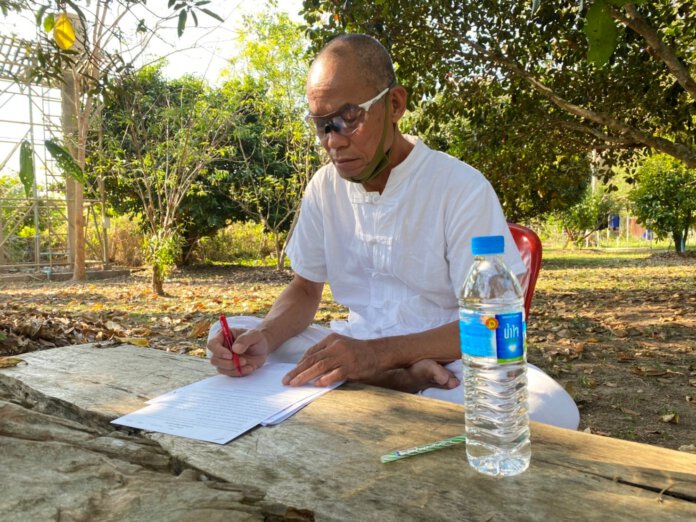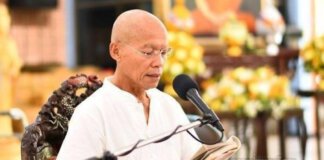ถามมา ตอบไป (ตอนที่ ๒)
๑๒ กุมภาพันธ์ ๒๕๖๕
ตอบ ผู้ใช้นามว่า “คนชังชาติ” ข้อที่ ๒ ที่ถามมาว่า พุทธะอิสระ ทำให้พระภิกษุสงฆ์แตกกัน จนคณะสงฆ์ต้องลงอุเขปนียกรรม แบบนี้หรือคนดี ?
ตอบ :
คุณกำลังกล่าวหาฉันด้วยถ้อยคำที่รุนแรงทีเดียวนะคุณ หากจะว่ากันตามหลักพระธรรมวินัย ภิกษุใดกระทำการให้ภิกษุสงฆ์ ที่ทรงสิกขาคือทรงศีลสิกขา ทรงสมาธิสิกขา ทรงปัญญาสิกขา แตกแยกกัน ภิกษุนั้นต้องอาบัติสังฆาทิเสส ซึ่งเป็นอาบัติหนักที่รองจากปาราชิกเท่านั้น
และหากจะพ้นจากอาบัติสังฆาทิเสสได้จะต้องอยู่กรรมลดค่าของตนเองลงจึงจะพ้นได้
และเป็นอนันตริยกรรม กรรมอันหนัก ห้ามสวรรค์ ห้ามนิพพาน แต่ไม่ห้ามนรก
ถามคุณคนชังชาติ กลับไปบ้างว่า คนผู้ห่มเหลืองมานานจนได้รับยศถาบรรดาศักดิ แล้วเข้าไปพัวพันกับคดีฟอกเงิน ยักยอกทรัพย์สินของวัดมาเป็นของตนเอง และทุจริตในหน้าที่ จนต้องคดี ศาลชั้นต้นมีคำพิพากษาลงโทษ
การที่พุทธะอิสระเป็นผู้ร้องเรียนให้ชำระอธิกรณ์ที่เกิดขึ้นในหมู่สงฆ์ ตามหลักพระธรรมวินัย มันจะกลายเป็นการทำให้สงฆ์แตกกันได้อย่างไร
อีกทั้งคนผู้ห่มเหลืองเหล่านั้น ก็มิได้ตั้งมั่นอยู่ในศีลสิกขา สมาธิสิกขา ปัญญาสิกขา อย่างแท้จริง
เช่นนี้จะเรียกว่า เป็นสงฆ์ผู้ทรงสิกขาได้อย่างไร
ส่วนพวกภิกษุผู้อยู่ต่างวัด ต่างจังหวัด ที่เป็นพวกพ้องของผู้ต้องคดี รวมหัวกันใช้โทสะ โมหะ ฝ่าฝืนพระธรรมวินัย บังอาจใช้อาญาเถื่อนประกาศลงอุเขปนียกรรมต่อพุทธะอิสระ
ทั้งที่รู้อยู่แก่ใจว่าการที่หมู่ภิกษุจะลงอุเขปนียกรรม ซึ่งแปลว่า การลงโทษพระภิกษุผู้ต้องหาอาบัติแล้วไม่ยอมรับอาบัติ
พระธรรมวินัย อนุญาตให้กระทำได้เฉพาะผู้ที่อยู่ในอาวาสเดียวกันเท่านั้น
หาใช้ภิกษุวัดอื่นจะมารวมหัวกันลงโทษแก่ภิกษุต่างวัดได้ไม่
ด้วยเพราะไม่เคยรู้ ไม่เคยเห็น ไม่เคยได้ยิน ไม่เคยตั้งข้อรังเกียจจากการอยู่ร่วมในสีมาเดียวกัน
ซึ่งมีพระธรรมวินัยในพระไตรปิฎก เล่ม ๖ ตอนกัมขันธกะ ว่าด้วยสังฆกรรม เกี่ยวด้วยการลงโทษแก่ภิกษุผู้ละเมิดพระธรรมวินัย
*************
พระวินัยปิฎก จุลวรรค เล่ม ๖ ภาค ๑
อุกเขปนียกรรม ที่ ๕
เรื่องพระฉันนะ
โดยสมัยนั้นพระผู้มีพระภาคเจ้าประทับอยู่ ณ โฆสิตาราม เขตพระนครโกสัมพี ครั้งนั้น ท่านพระฉันนะต้องอาบัติแล้ว ไม่ปรารถนาจะเห็นอาบัติ
บรรดาภิกษุที่เป็นผู้มักน้อยต่างก็เพ่งโทษ ติเตียน โพนทะนาว่า
ไฉนท่านพระฉันนะต้องอาบัติแล้ว จึงได้ไม่ปรารถนาจะเห็นอาบัติเล่า
แล้วกราบทูลเรื่องนั้นแด่พระผู้มีพระภาคเจ้า
ลำดับนั้น พระผู้มีพระภาคเจ้ารับสั่งให้ประชุมภิกษุสงฆ์ ในเพราะเหตุเป็นเค้ามูลนั้น ในเพราะเหตุแรกเกิดนั้น แล้วทรงสอบถามภิกษุทั้งหลายว่า
ดูก่อนภิกษุทั้งหลาย ได้ยินว่า ภิกษุฉันนะต้องอาบัติ แล้วไม่ปรารถนาจะเห็นอาบัติจริงหรือ?
ภิกษุทั้งหลายกราบทูลว่า จริง พระพุทธเจ้าข้า
พระผู้มีพระภาคพุทธเจ้าทรงติเตียนว่า
ดูก่อนภิกษุทั้งหลาย การกระทำของโมฆบุรุษนั้นนั่น ไม่เหมาะ ไม่สม ไม่ควร มิใช่กิจของสมณะ ใช้ไม่ได้ ไม่ควรทำ ไฉน โมฆบุรุษนั้นต้องอาบัติแล้ว
จึงไม่ปรารถนาจะเห็นอาบัติเล่า
ดูก่อนภิกษุทั้งหลาย การกระทำของโมฆบุรุษนั้นนั่น ไม่เป็นไปเพื่อความเลื่อมใส ของชุมชนที่ยังไม่เลื่อมใส
ดูก่อนภิกษุทั้งหลาย ถ้าเช่นนั้น สงฆ์จงทำอุกเขปนียกรรม ฐานไม่เห็นอาบัติแก่ภิกษุฉันนะ คือ ห้ามสมโภคกับสงฆ์
ดูก่อนภิกษุทั้งหลาย ก็แล วิธีลงอุกเขปนียกรรม ฐานไม่เห็นอาบัติ
พึงทำอย่างนี้ คือ
พึงโจทภิกษุฉันนะก่อน ครั้นแล้วพึงให้เธอให้การ แล้วพึงปรับอาบัติ
ครั้นแล้ว ภิกษุผู้ฉลาด ผู้สามารถ พึงประกาศให้สงฆ์ทราบ
ด้วยญัตติจตุตถกรรมวาจา ว่าดังนี้:-
ท่านเจ้าข้า ขอสงฆ์จงฟังข้าพเจ้า พระฉันนะนี้ต้องอาบัติแล้ว ไม่ปรารถนาจะเห็นอาบัติ ถ้าความพร้อมพรั่งของสงฆ์ถึงที่แล้ว สงฆ์พึงทำอุกเขปนียกรรม ฐานไม่เห็นอาบัติแก่พระฉันนะ คือ ห้ามสมาคมกับสงฆ์ นี่เป็นญัตติ
ท่านเจ้าข้า ขอสงฆ์จงฟังข้าพเจ้า พระฉันนะนี้ต้องอาบัติแล้ว ไม่ปรารถนาจะเห็นอาบัติ สงฆ์ทำอุกเขปนียกรรม ฐานไม่เห็นอาบัติแก่พระฉันนะ คือ ห้ามสมาคมกับสงฆ์
ข้าพเจ้ากล่าวความนี้แม้ครั้งที่สอง
ข้าพเจ้ากล่าวความนี้แม้ครั้งที่สาม
เหตุนั้นจึงนิ่ง ข้าพเจ้าทรงความนี้ไว้ ด้วยอย่างนี้
ดูก่อนภิกษุทั้งหลาย พวกเธอจงบอกภิกษุผู้อยู่ในอาวาสต่อๆ ไปว่า
พระฉันนะถูกสงฆ์ทำอุกเขปนียกรรม ฐานไม่เห็นอาบัติแล้ว คือ ห้ามสมาคมกับสงฆ์.
****************
และภิกษุผู้ลุแก่โทษรวมหัวกันลงทัณฑ์เถื่อนแก่พุทธะอิสระ ทั้งที่ควรจะไปประกาศลงทัณฑ์กับพวกมักมาก ทุจริต ประพฤติมิชอบต่อหน้าที่คณะสงฆ์พวกนั้นกลับไม่ทำ
ดันมาใช่อาญาเถื่อนลงทัณฑ์แก่พุทธะอิสระเพื่อปิดปาก ทำให้หวาดกลัวจะได้ไม่ทำความชั่วของพวกตนเองไปโพทนา
พุทธะอิสระจึงให้ทนายรวบรวมหลักฐานฟ้องต่อศาล จนศาลรับฟ้อง
เกิดขบวนการประนีประนอม ผู้กระทำผิดจึงขอขมา
พุทธะอิสระจึงถอนฟ้องให้
ความจริงเรื่องนี้พวกคุณควรต้องขอบคุณพุทธะอิสระเสียด้วยซ้ำ ที่ช่วยกำจัดอลัชชีที่เข้ามาอาศัยผ้าเหลืองหาผลประโยชน์
แต่นี่อะไร พวกคุณไม่ชมแล้วยังมาด่าฉันอีก แบบนี้นี่แหละที่โบราณท่านว่า เห็นกงจักรเป็นดอกบัวหละ
พุทธะอิสระ
——————————————–
Questions and Answers (Part 2)
February 12, 2022
Answer : The second question of “anti-patriot”: Buddha Isara caused a schism in the monastic community, and the monastic community agreed on the punishment of suspending Buddha Isara’s monkhood. Was this an act of a good person?
Answer :
You are accusing me with harsh words. According to monastic rules, if a monk causes disharmony within a monastic community in which monks adheres to principles of morality, concentration, and wisdom, it means that monk has committed a serious ecclesiastical offense. Its severity is second only to the gravest offense of expulsion.
After committing this serious ecclesiastical offense, that monk must regret and accept punishment. During the penalty, that monk’s position will be inferior to fellow monks. After his self-improvement, he will be accepted back to the monastic community.
This ecclesiastical offense is also included among the gravest sins that once anybody has committed it, they are destined to hell and are prohibited from heaven and nirvana.
May I ask you back? Those who had worn monk robes for a long time and received ecclesiastical ranks were involved with money laundering, embezzlement of temple funds, and corruption. Then, the Court of First Instance issued them a verdict.
Then, I petitioned for a clarification of the dispute within the monastic community, in compliance with monastic discipline. How could this cause schism within the monastic community?
Though they were in monk robes, they did not practice any religious precepts, concentration, or wisdom. How could we call them a monastic community adhering to monastic practice?
Monks of other temples and other provinces, who are allies of these accused people, violated monastic rules. They dared to announce the punishment by suspending my monkhood. Although they knew that the monastic discipline allows such action only for monks staying within the same monastery. Monks from different temples may not punish monks living in other temples, because
they have not known, seen, or heard, unlike monks within the same monastery.
The sixth book of Buddhist Scriptures (The Three Baskets or Tripitaka) on monastic discipline, states monastic rule in punishing a monk who has committed a serious ecclesiastical offense.
*************
Basket of the Discipline, Smaller Section, Sixth Book, First Part
The Formal Act of Suspension (V)
Story of Phra Channa had committed an ecclesiastical offense, but he did not accept it.
Some monks criticized Phra Channa that he had committed the offense, but he refused to acknowledge the charge, argued his case, and pleaded that the charge is dismissed.
They reported the story to the Buddha. Then, the Buddha called for a meeting of monks on that matter and asked the monks.
“Bhikkus, I have heard that Phra Channa had committed the offense, but he refused to acknowledge the offense. Is it true?”
Then, all of Bhikkus replied, “Yes, sir.”
Therefore, the Buddha admonished it, “Bhikkus, such demeanor is inappropriate for monks. How could a monk refuse to acknowledge his offense? Such behaviors would not be respectable for people.
Bhikkus, in this case, the monastic community may consider the formal act of suspension and ostracism, as a result of Phra Channa’s refusal to acknowledge the offense.
First, Bhikkus, you may first question Phra Channa’s offense and let him explain.
After that, a representative of all monks may announce to the monastic community three times, “Fellow monks, please listen to me. Phra Channa committed the offense, but he refused to acknowledge the charge. Monks of this monastery have agreed to punish Phra Channa by means of suspension and ostracism.” Bhikkus, if nobody opposes it, you shall announce that Phra Channa has been punished by means of suspension and ostracism. Therefore, Phra Channa may not associate with other monks.
Those monks illicitly announced a suspension and ostracism against me, even though they should have done that towards the corrupted monks instead.
They illicitly announced a suspension and ostracism against me, because they feared that their wrongdoing would be disclosed.
Therefore, I had my lawyer collect all evidence and submit a lawsuit to the court and the court accepted it.
Then, they apologized to me and wanted to compromise.
Therefore, I withdrew the lawsuit.
Actually, you should thank me for helping to get rid of shameless, corrupted monks that have earned money from monk robes.
On the other hand, you did not compliment but criticized me. Like a proverb says, “mistaking blades for a lotus”.
Buddha Isara







